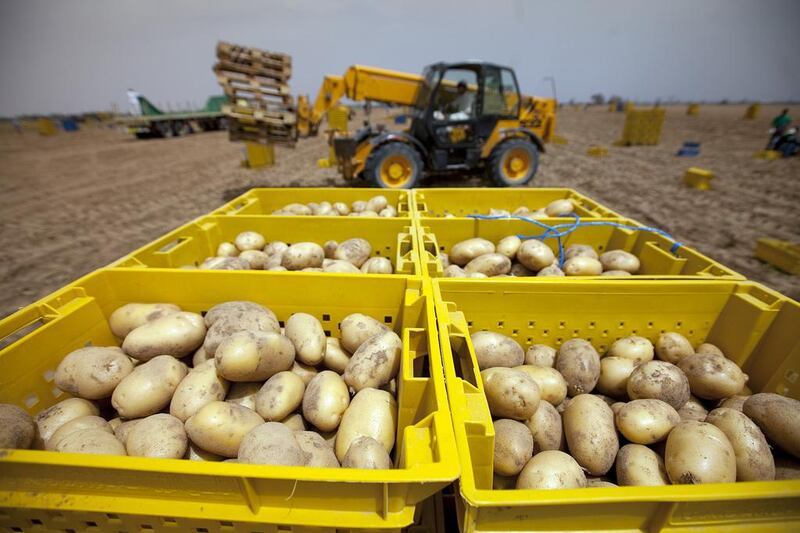In the field of future studies, the “black elephant” stands tall. A cross between the two idioms “the elephant in the room” and “a black swan”, it is an issue policymakers see but do not adequately address. Within policymaking circles in West Asia and North Africa (WANA), climate change, air pollution and education reform are prime examples. Food security, meanwhile, is equivalent to a black elephant on a rampage.
According to the United Nations’ Food and Agriculture Organisation (FAO), food security exists when all people, at all times, have physical, social and economic access to sufficient, safe and nutritious food that meets their dietary needs and food preferences for an active and healthy life.
In recent years, the premise of food security in WANA has been overshadowed by political upheaval, conflict, terrorism, economic stagnation and the humanitarian crises that follow such events. And it shows.
In 2015, the FAO highlighted that WANA was the only region in the world where there was an increase in hunger. While countries such as Israel, Qatar and Oman ranked highly on The Economist Intelligence Unit’s Global Food Security Index, Syria and Yemen came 96th and 100th, respectively, out of 113 countries.
With the siege of Aleppo over, this may be a moment to reflect on the Syrian conflict. In retrospect, little attention has been paid to the underlying factors that set the war in motion. Fighting has been sustained with such intensity because of a complex set of interrelated reasons that, triggered by demonstrations elsewhere in the region, included economic inequality, demands for greater political freedom, and religious and sociopolitical grievances. In the years leading up to the start of the conflict in 2011, Syria was confronted by one of the most serious droughts in its modern history. In 2010, the collapse of farmland led to more than 50,000 families migrating to urban areas.
According to the UN special rapporteur on the right to food, Olivier de Schutter, the drought pushed 3 million to 4 million Syrians into extreme poverty. Climate change, mismanagement of resources and food security concerns, and structural economic reform programmes, created the Syrian tinderbox.
In the Raqqa of 2010, displaced farmers spoke of polluted wells, dead sheep and dry fields. Today, as ISIL controls the city, it is not hard to see why many destitute farmers were drawn to the extremist group in the hope of an alternative.
Every nation must develop a geographic, cultural and climate-specific framework for how to achieve food security. Here, Syria serves as a cautionary tale. The effects of climate change will drastically alter the formula – regional food exporters will export less, while the price and distance involved in the safe provision of foodstuffs will increase for food importers.
In a region where 50 per cent of food is imported, policymakers must be prepared for any scenario. In Egypt, a country that has traditionally done well to diversify local crops by including imports, the pound’s devaluation directly affected the availability and affordability of foodstuffs. With inflation running at almost 20 per cent, real food prices have skyrocketed and imported goods have become scarce.
Few solutions are being tested. From a policy perspective, Gulf countries, which import about 90 per cent of their food, are seeking to build resilience by diversifying imports according to country of origin. GCC companies made headlines over their purchases of land in Australia, Ukraine, across East Africa and even in the United States. From a technological perspective, Qatar, Oman and the UAE are all testing forms of hydroponics as a way of circumventing their arid climates. While the science will probably improve, the level of agricultural output will not allow any of these countries to ever be fully self-sufficient.
Focus should remain on developing a national framework for public-private partnerships and scientific research. WANA nations would do well to work within a regional framework to build comparative advantages. As the UAE increases its fish-farming capacity, neighbouring countries should seek to increase their proficiency in other areas of food production. These linkages, along with a sustainable planning framework and the sharing of knowledge and resources, will build a level of regional resilience so urgently needed.
Last year, oil-exporting economies balanced their spending, while oil-importing economies dealt with the pinch of reduced remittances and foreign direct investment. As policymakers decide where to make cuts, concerns surrounding the sustainability and availability of affordable foodstuffs may be cast aside.
But food security is of vital importance to the security of the state and the livelihood of its people, and therefore remains the “black elephant” in the room. Let us hope it does not charge.
Tarik Chelali is a senior analyst at The Delma Institute in Abu Dhabi, and a contributor to the West Asia-North Africa Quarterly, which launches this week
On Twitter: @DelmaInstitute





